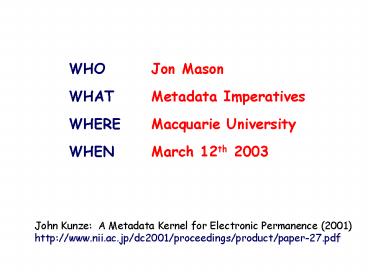Metadata Imperatives - PowerPoint PPT Presentation
1 / 15
Title:
Metadata Imperatives
Description:
Organising information. for subsequent discovery & retrieval. to enable data interchange ... linking or organising content chunks into aggregates (printed books ... – PowerPoint PPT presentation
Number of Views:54
Avg rating:3.0/5.0
Title: Metadata Imperatives
1
John Kunze A Metadata Kernel for Electronic
Permanence (2001) http//www.nii.ac.jp/dc2001/proc
eedings/product/paper-27.pdf
2
- Metadata Imperatives
- Macquarie UniversityMarch 12th 2003
- Jon Mason jmason_at_educationau.edu.au
3
Subject
Metadata Imperatives
Keywords
Metadata, meta-tags, context, Macquarie
University, 2003, debate, AESHareNet, standards,
debate, Powerpoint presentation, value-chains,
information economy, structured information,
interoperability, HTML, XML, RDF, RSS, IEEE, DC,
..
4
(No Transcript)
5
My Position
- To Meta-Tag or Not to Meta-Tag dumbs-down the
discourse on metadata - The Information Economy has only just begun -
metadata is integral to it - Knowledge Management perspectives are
increasingly important
6
The Explanation
- Advocacy
- Why imperatives?
- Meta-tagging just one consideration
- Forms of metadata
- Context
- information economy KM perspectives
- information learning learning technologies
- Metadata standards protocols
- Questions
7
Imperatives? What for Why
- Organising information
- for subsequent discovery retrieval
- to enable data interchange
- separating content-structure-presentation
- Participating in the digital economy
- networked environment (diverse complex)
- information relationships
- economic value-chains based on value creation
rather than value extraction - Organising knowledge
8
Imperatives? How Metadata creation
- Keyword Craft
- Abstract (description) construction
- Standard classifications
- Standard schemas
- Standard encodings
9
Forms of Metadata
- Surface (eg, web page last updated)
- Embedded
- as HTML META tags
- as custom XML tags (metadata-rich markup)
- Detached
- in repositories of catalogued information
- RDF statements (relationship-rich)
- RSS channels
- Formally defined standards protocols
- Dublin Core (ANSI Z39.85)
- IEEE LOM (IEEE 1484.1-2002)
- METS (Metadata Encoding Transmission Standard)
10
Forms of Metadata (2)
- Descriptive (aboutness)
- Structural
- linking or organising content chunks into
aggregates(printed books are relatively
self-organising e-content can have infinitely
assigned structural maps) - Administrative
- eg, managing catalogues
- metadata IP meta-metadata
- File Groups
- associating content chunks
- Behaviour
- rule-based
- (METS - http//www.loc.gov/standards/mets/ )
11
Context time place
- Information depends on context to convey meaning
- Information Economy
- data, information, knowledge all intermeshed
- one persons content is anothers data
- Web services environment
- Learning, Education Training
- complex adaptive systems
- tasks describing, accessing, exchanging
managing educational resources - What is content?
12
context
Complex Adaptive Systems
Recursive Cycles
13
Ongoing Questions
- How best to encode context?
- separate from content (eg., EML, EAD, EAC)
- embedded within descriptive metadata?
- include in Audience descriptions?
- include in Activity descriptions?
- Knowledge Management considerations
- Is completeness of description possible?
- How to achieve interoperability?
- DC, ERC, LOM HTML, XML, RDF,
- Semantic Web (semantics syntax)
- balancing generalist specific classifications
14
Knowledge Management Perspectives
15
Knowledge Management Perspectives
Know































